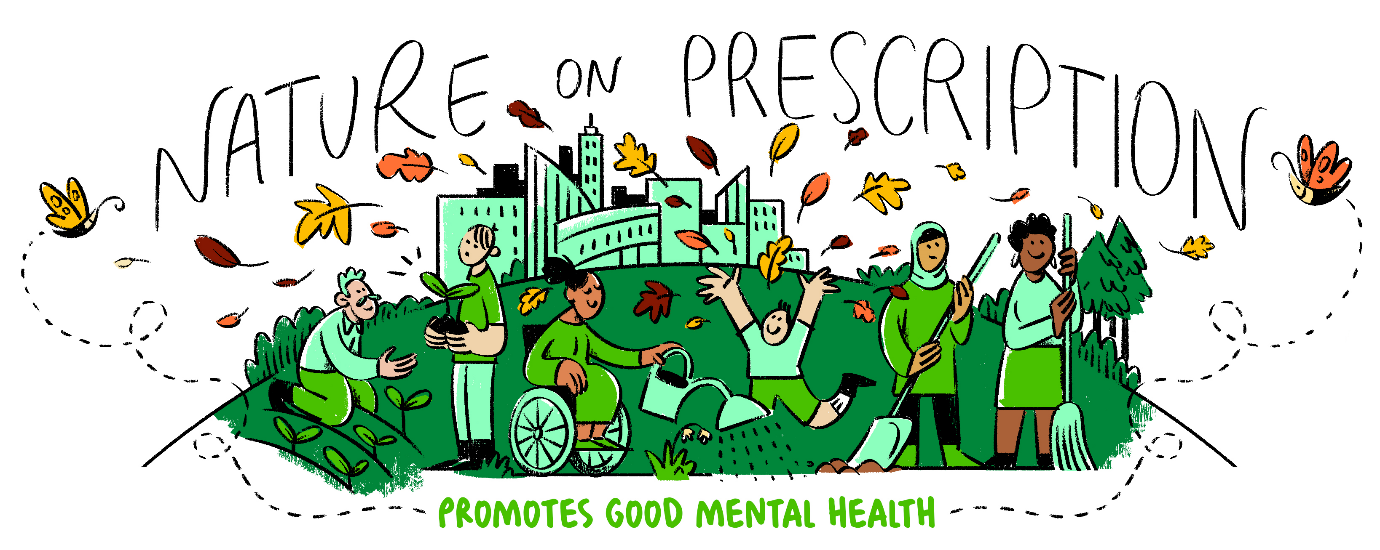Social Prescribing – an overview
Social Prescribing entails linking individuals from primary care (often their GP) to social interventions, with the potential to improve health and wellbeing. This pathway expands available options to clinicians whose patients have complex social and medical needs, by connecting them to community resources, information and social activities, as well a range of statutory and non-statutory agencies.
Potentially, social prescriptions can enable healthcare professionals to respond more effectively to a range of non-clinical needs and connect patients with professionals who are able to provide longer consultations and more detailed knowledge of local social activities.
The range of activities is diverse and can include gardening programmes, books on prescription, exercise on referral, referral for debt counselling, or housing advice. The range is such that the mechanisms of action are also diverse and can be activated through being with people, cognitive stimulation, or identity generation. In this way, social prescriptions are potentially applicable for treating a broad range of conditions or their prevention.
The practice of social prescribing is growing in popularity, but delivery is also disparate, variable and complex. A variety of referral models exist, ranging from signposting by primary care practitioners through to iterative activity choices, facilitated by link workers who can meet at length with patients and collate available activities to suit need and lifestyle, as well as provide a point of ongoing contact. There are myriad ways in which this process can be disrupted; for example if staff are not aware or unsupportive of the idea, or patients are unable to initiate their particular social prescription, it is impossible to maximise the potential of the service, ensure appropriate use, and avoid wasting resources.
There is then a risk of social prescribing services being developed without evidence about what should be offered or the processes that are required to support them. A disconnect between health and other services might result in patients not getting a social prescription appropriate to their needs. Our research programme seeks to generate robust evidence about what works, for whom, and in what ways.
Background
Feelings of stress, depression and anxiety are common amongst both men and women in the UK, with sources suggesting that 1 in 4 women and 1 in 10 men experience depression on a serious enough level to require treatment during their lifetime. Typically, recommended treatment may include exercising or medication, such as anti-depressants. However, the desired effect is not always achieved with these options and patients may not be able, or wish to undertake these treatments. Because of this a new treatment approach is needed to encompass all needs and desires.
One set of treatments that are potentially suitable for diverse groups are nature-based group activities, such as community gardening or conservation work. There is evidence to suggest that the undertaking nature-based activities can have a positive impact on the patient wellbeing. As a result, numerous organisations including MIND and the Conservation Volunteers, are working with GPs, nurses or mental health workers to offer them as a form of ‘social prescription’ or community referral.
However, there are questions surrounding nature-based activities, due to variety, frequency and length of attendance. It is therefore unclear what activities, delivered in what ways, may have the most positive impact on patients.
Project aims
This project aims to provide evidence for these gaps in knowledge, by designing a programme of nature-based group activities suitable for prescribing through primary care and other pathways, allowing for a better understanding what programmes have the best impact.
To achieve the aim researchers will work with relevant NHS staff, people with common mental health conditions and their families and organisers of current nature-based group activities, and use existing information from research literature.
From this, we will be able to better understand and analyse how and why different elements of a programme might help with depression, anxiety and stress related conditions. Additionally, we will be able to explore how this should be organised for future activities, and be able to test the acceptability and effectiveness of nature-based group treatment.
Project activity
This project will use a structured approach to developing a complex intervention, to design a nature-based intervention for people with, or at risk of, common mental health conditions. In addition to the three core MRC phases of: (a) identifying existing evidence; (b) identifying or developing a theory and (c) modelling process and outcomes; four other phases will also to be incorporated: (d) problem identification and definition; (e) determining of recipients’ and providers’ needs; (f) examination of current practice and context and (g) intervention design.
Three interlinked and iterative activities will inform phases (a) to (f): (i) Evidence syntheses (addressing phases a, b, c, e and f.) (ii) Stakeholder consultation: Initial consultation meetings with three core stakeholder groups: people with common mental health conditions and their families, including those who have previously taken part in nature-based activities, people from primary care, and those involved in delivering nature based activities (phases b, c, d, f). iii) Formal focus groups with each of the stakeholder groups will allow better understanding of current practice, perceived impacts and the needs of those with mental health conditions, primary care practitioners, and those who deliver nature-based activities (phases c, e, f).
Nature on Prescription Handbook
We have produced an intervention manual, the Nature on Prescription Handbook, showing approaches to activity design; a detailed logic model and programme theory showing how nature-based, group activities may benefit those with, or at risk of, common mental health conditions in differing contexts and through differing mechanisms; and a protocol for use in a future feasibility study.
This resource provides guidance and best practice for organisations, helping them to develop services which are beneficial, safe and sustainable.

You can download the Nature on Prescription Handbook here. This will take you to a simple form where we will ask you for your email address and organisation so we can measure impact and reach of the handbook. There will also be an opt-in tick box if you are happy for us to contact you regarding future research in this area.
Related publications

Impact of COVID-19 on social prescribing across an Integrated Care System: A Researcher in Residence study
Download the PaperLink worker perspectives of early implementation of social prescribing: a ‘Researcher-in-Residence’ study
Download the PaperPrescribing gardening and conservation activities for health and wellbeing in older people
Download the PaperSocial prescribing offers huge potential but requires a nuanced evidence base
Download the PaperA realist review and collaborative development of what works in the social prescribing process
Download the PaperWhat approaches to social prescribing work, for whom, and in what circumstances? A protocol for a realist review
Download the PaperParticipation in environmental enhancement and conservation activities for health and well‐being in adults: a review of quantitative and qualitative evidence
Download the PaperResources
- National Association of Link Workers
- Read the Scriberia case study on our work to produce the Nature on Prescription Handbook Nature on Prescription? Exeter Shows the World How
Collaborators
- Dr Rebecca Lovell, University of Exeter
- Dr James Fullam, University of Exeter
PenARC Staff

Dr Felix Gradinger
Researcher-in-Residence (Integrated Care)
Dr Harriet Hunt
Postdoctoral Research Fellow
